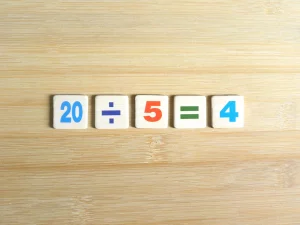For nearly all Year 6 children, SATs preparation takes centre stage in their lives: at school during classes, when working on homework assignments, and even at home. While naturally, schoolwork plays the most prominent role in preparation, parents still have an important contribution to make to their children’s study in the months leading up to the English and Maths SATs exams in May.
Preparing for the tests at home will boost your child’s confidence and help them to feel more relaxed. So, as a first-time SATs parent, how can you support your child in their SAT prep and complement what they are learning at school?
Have a look at our helpful and reassuring advice and study the practical tips that will put you and your child ahead of the SATs preparation game before they take off to secondary school.
1. Practise Mental Maths
It’s essential that your child has excellent mental maths skills when taking their Year 6 SATs. As a skill, mental maths can be improved with practise, so the more your child practises, the easier it will be for them to make calculations at lightning speed during the SATs tests.
As parents, we know that getting your child to practise maths is easier said than done. For that reason, encourage them to integrate practise into everyday situations.
For example, ask your child to be the scorekeeper in a Scrabble game, to count the change when you’re out shopping for groceries, or even to double-check receipts. Without a calculator your child will be compelled to use their mental maths skills.
The more often they’re exposed to these types of situations, the sharper their mental maths skills will become and the faster they’ll progress!
2. Do a Lot of Reading
A big chunk of your child’s Year 6 SATs English exam will test their ability to demonstrate comprehension skills. In essence, reading comprehension is all about processing text, understanding its message, or meaning, and integrating it with prior knowledge.
Since the text for this section of the exam is not known until the exam itself, there is no material to memorise; the best preparation method is for your child to read as much as they can.
Do your best to encourage and guide them through texts and books of different styles, tones, and subjects. The most important part is to allocate time after each reading period for discussion. Discuss characters, text structure, vocabulary, and any other aspect of the text your child is interested in.
Ideally, your child will make reading a habit and find it enjoyable rather than equate it with ‘study’. They will also enjoy discussing their thoughts with you so make it feel like quality knowledge time. These sessions will be more helpful than you think because your child is
simultaneously revising, preparing, and improving their comprehension skills for their Year 6 SATs. Over time, their decoding of words will significantly improve, and the SATs will be a piece of cake!
3. Be Your Child’s Teacher: Teach Them Fractions
Based on past maths SATs results, Year 6 children tend to face difficulties with multi-step maths questions, especially fractions.
Integrating addition, subtraction, division, or multiplication and times tables almost always acts as a stumbling block for children.
Unfortunately, though, fractions are an inevitable part of the SATs maths tests. So, as part of their preparation, you and your child should practise questions that involve multiple steps. But before that, we recommend going back to the basics.
Some children can work their way through fractions without any understanding of the concept behind them, so put on your teacher’s hat during this phase and ensure that your child has a solid foundation when it comes to fractions.
Once you’re sure that they’ve fully grasped the concept, start introducing the advanced questions. Solve as many SATs questions as possible – it’s much better for your child to become surprised or confused at home than during the exam!
4. Focus on Problem-Solving
To put things into perspective, at Year 6 SATs level, pupils must sit three maths papers: one arithmetic SATs paper and two reasoning SATs papers.
Your child will be presented with both straightforward and more complex problems, including multi-step problems on the arithmetic SATs paper. In contrast, the SATs reasoning papers test children’s ability to apply their understanding of different areas of mathematics and to select relevant information to present answers in a correct context.
When tackling reasoning questions, an inability to pinpoint the key information may result in your child providing incorrect solutions. Yet, problem-solving is always an integral part of both arithmetic and reasoning questions.
Because of that it would be helpful during your child’s SATs revision to focus on problem-solving tricks and guidance related to the main mathematical concepts and operations: addition, subtraction, multiplication, and division.
Get your child to solve as many problems as possible, and touch on fraction calculations, decimals, and percentages.
Another key element of SATs revisions is to make sure your child knows how to show their workings.
5. Solve Inference and Deduction Worksheets and SATs Papers
Preparing for the comprehension skill tests in the Year 6 SATs, means focusing on inference and deduction questions. To clarify, inference questions are those that require students to “read between the lines” of a text, and deduction questions are those that require them to read “beyond the text”.
Once your child masters these skills, consider them a master of the Year 6 SATs, too!
So, what do these questions look like within the SATs tests, and how are these skills tested? Here are a couple of examples:
Inference:
…like a toy sitting on a glass table.
What does this description suggest about the boat?
Answer:
Here, kids are expected to understand and explain how the meaning is enhanced through word choices. For example, the correct answer could be either that the boat was small or insignificant or that it was still or unmoving, creating no ripples.
Deduction:
Gaby thinks she made two mistakes while trying to rescue the cat.
What is the first mistake that Gaby made while trying to rescue the cat?
Answer:
Here, teachers will look for students’ abilities to retrieve and record information and identify key details from both fiction and nonfiction text. The correct answer would be that Gaby looking down is the first mistake she makes.
So that your child can build confidence in inference and deduction of knowledge questions, it’s highly recommended they read a considerable amount to build a wide vocabulary. Secondly, Year 6 SATs workbooks are available – your child can work through questions and assessments. Some are in the form of games and will help your child progress effectively.
Plus, of course, there are always SATs practice papers to indicate which types of question should be expected.
6. Work Through as Many SATs Practice Papers as Possible
One of the best ways parents can help their children prepare for their Year 6 SATs exams is through SATs practice papers – still the best among all SATs resources for revision.
SATs practice tests cover everything included in the exam, such as English and Maths and their related branches: reading, English grammar, punctuation, and spelling, and fractions, algebra, division, and multiplication etc.
To help your child prepare effectively for the Year 6 SATs exams, encourage them to focus on working through as many practice papers as possible. They are an excellent way for students to get acquainted with the SATs exam format, layout, and question styles.
Plus, the answers and marks are included which helps the learning process.
It’s best to introduce practice papers early on into your child’s preparation process to ensure that they have sufficient experience in answering questions under time constraints.
Speaking of time constraints, it’s common for students to score significantly less in the questions at the end of the SATs tests, although they aren’t necessarily more difficult. This phenomenon has been attributed to children struggling with time management so, work with your child to improve that skill, perhaps by running timed exam sessions at home.
As a parent, the best preparation you can give your child for their Year 6 SATs is to provide them with your experience of effective time management, advise them how much time they have to answer each question type, how to eliminate incorrect answers, and what to do when they’re stuck on a question during their SATs test.
And of course, exercise what they’ve learnt by putting it to the test!
Tip: Students should be able to complete each of the SATs papers with ten minutes to spare for revision or to go back to any unanswered questions: that should be your target.
Your Child Is Ready to Ace Their Year 6 SATs!
The tips we’ve presented and discussed in this guide are all quite simple. There is no necessity to use all of the techniques, just use the combination that you know will work for your child.
Remember, the whole idea behind these tips is to improve your child’s confidence and reduce stress on the day of the SATs, and the key is to make good progress with practice. So, make sure your child gets plenty of it and focuses on the key skills before SATs week!
At the same time, try to make your child’s final primary school year an exciting one and encourage them to make memories along the way before they ace their SATs and head off to secondary school!
If you need help from one of our maths tutors in Jersey, then please get in touch.





